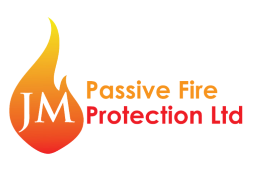What Are Fire Cavity Barriers
One of our services here at JM Passive Fire Protection is providing Fire Cavity Barriers but
what exactly is this? Here we explain the benefits to having fire cavity barriers and how to
main them on your premises.
Fire cavity barriers are materials or assemblies designed to prevent the spread of fire and
smoke through hidden cavities in building structures. These cavities can exist in various
places, such as within walls, floors, roofs, and around service penetrations. By closing off
these spaces, fire cavity barriers help to contain fires within a limited area, giving occupants
more time to evacuate and allowing firefighting measures to be more effective. Here are
some key aspects of fire cavity barriers:
Functions and Benefits
- Fire Containment – Prevents the spread of flames and smoke through cavities, helping to
contain the fire to its origin. - Smoke Control – Limits the movement of smoke, which is critical as smoke inhalation is a
major cause of fatalities in fires. - Structural Protection – Helps maintain the integrity of the building structure by preventing
fire from spreading to critical areas.
Types of Fire Cavity Barriers
- Linear Gap Seals – Intumescent or fire-resistant materials used to seal linear gaps
between construction elements, this would be applied where walls meet floors, ceilings, or
other walls. - Cavity Barriers for External Walls – Barriers installed within the cavity of external wall
systems, often in cladding or facade assemblies, would be used to prevent fire from
spreading vertically or horizontally within the wall cavity. - Service Penetration Seals – Intumescent collars, wraps, or sealants around pipes, ducts,
and cables passing through walls or floors, these would be applied to seal around
penetrations to maintain the fire resistance of the barrier. - Fire-Stopping Boards and Batts – Rigid or semi-rigid boards made from fire-resistant
materials like mineral wool and would be installed within large cavities or over service
penetrations to prevent fire spread. - Intumescent Products – Materials that expand when exposed to high temperatures, filling
gaps and creating a fire-resistant barrier and come in various forms such as strips, seals,
and paints.
Installation Considerations
Compliance with Building Codes – Fire cavity barriers must meet specific fire resistance
standards and be installed in accordance with local building regulations.
Correct Placement – Proper positioning is crucial for effectiveness, typically at junctions of
construction elements, around openings, and within wall cavities.
Regular Inspection and Maintenance – Fire barriers should be inspected regularly to ensure
they remain intact and effective, particularly after any building modifications.
Applications
Commercial Buildings – High-rise buildings, office complexes, and shopping centres often
have extensive cavity spaces that require effective fire-stopping measures.
Residential Buildings – Multi-story residential buildings need cavity barriers to prevent fire
spread between units and floors.
Industrial Facilities – Factories and warehouses with large open spaces and complex service
installations use cavity barriers to protect critical areas.
Public Buildings – Schools, hospitals, and government buildings utilize cavity barriers to
safeguard occupants and infrastructure.
Fire cavity barriers are an essential component of a building’s passive fire protection system,
contributing significantly to the overall fire safety strategy.
Our team here at JM Passive Fire Protection are highly skilled and qualified to install and
complete cavity barriers, working on projects across the country.
We also offer training for anyone looking to enter the Passive Fire Protection industry, this
starts off with our introduction to the sector and gaining your CSCS green card fully accredited through GQA.
For further information on Fire Cavity Barriers please contact us at JM Passive Fire on 0151 329 3230 or fill in the contact form below
Contact Form for more information on Fire Cavity Barriers
To book onto our next training programme call 07908780307 or complete the below form

